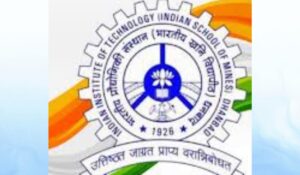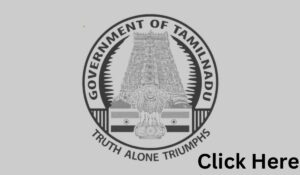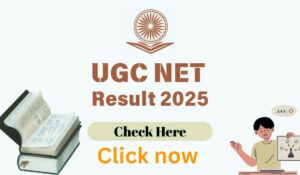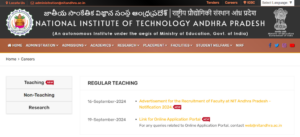UGC NET Syllabus 2024: To pass the UGC NET Exam scheduled from 1st January to 19th of 2025, candidates must be familiar with the most recent UGC NET syllabus.
UGC NET Syllabus 2024, Check Full Syllabus
The UGC NET test is used to determine whether candidates are eligible for Assistant Professor, Junior Research Fellowship (JRF), or both Assistant Professor and JRF posts at Indian colleges and universities.
Paper 1 has a common syllabus for all posts, while paper 2 has a different syllabus depending on the subject chosen. We have included the UGC NET 2024 syllabus in this article, as it is a key component in preparing for the exam.
UGC has delegated the National Testing Agency to administer the UGC Net 2024 for 83 subjects in order to determine eligibility of students in Indian Universities and Colleges to become “Assistant professors” or “Junior Research Fellowships”. This article covers the UGC NET syllabus.
UGC NET Syllabus 2024 – Highlights
Both are multiple-choice (MCQ) questions. All the candidates must know that 3 hours have been allotted to complete both the papers. Start preparing for the exam now, And read the syllabus in detail to get good grades.
Also Read: TSPSC Group 2 Syllabus 2024, Detailed Syllabus Here
| UGC NET Syllabus 2024- Highlights | |
| Organization | National Testing Agency (NTA) |
| Name of Examination | UGC NET Exam 2024 |
| Duration of Exam | 03 hours |
| Exam Date | 1st to 19th January 2025 |
| Total No. of Questions | 150 |
| Total Marks | 300 |
| Mode of Exam | Online – CBT (Computer-Based Test) |
| Marking Scheme | 02 marks for each correct answer |
| No. of Subjects | 83 subjects |
| Negative Marking | No negative marking |
UGC NET Syllabus 2024 Exam Pattern
The UGC NET 2024 examination will be conducted online (Computer Based Test).
| UGC NET Exam Pattern 2024 | ||||
| Paper | Pattern of Paper | Number of Questions | Marks | Duration |
| Paper-I | The questions will be generic in nature, intending to assess the teaching/research aptitude of the candidate. | 50 | 100 | 03 hours (180 minutes) |
| Paper-II | This is based on the subject selected by the candidate and will assess domain knowledge. | 100 | 200 | |
| Total | 150 | 300 | ||
Important Points:
- Candidates will get 2 marks for each correct answer in Paper 1 and Paper 2.
- There is no negative marking in this exam.
- Questions marked as unanswered/marked for review will not be graded.
- All questions must be answered.
- The candidate who attempted the question, and chose one of the correct responses will receive credit. All candidates will receive marks, If there are any questions that were dropped.
UGC NET Syllabus 2024 – Paper 1 Syllabus 2024
The UGC NET paper 1 syllabus includes subjects that help assess the candidate’s ability to teach and conduct research, as well as cognitive abilities and general awareness of teaching and learning processes within the higher education system.
Paper 1 has 50 questions and 100 marks. Below is the detailed syllabus for UGC NET Paper-1 and a PDF file of it.
UGC NET Paper 1 Syllabus PDF 2024
Unit I: Teaching Aptitude
- Teaching: Concepts, Objectives, Levels (Memory and Understanding), Characteristics and Basic Requirements
- Learner’s characteristics: Characteristics for adolescent, adult, and non-adolescent learners (Academics, Social, Emotional, and Cognitive), individual differences
- Factors that affect teaching Teacher and Learner, Support Material, Instructional Facilities, Learning Environment, and Institution
- Teaching methods in higher education institutions: Learner-centred or teacher-centered? Offline vs. online methods (Swayam/Swayamprabha/MOOCs, etc.).
- Supporting Teaching System: Modern, Traditional and ICT-based
- Evaluation System: Elements, types and evaluations, evaluation in the Choice Based Credit System of Higher Education, computer-based testing, innovations in evaluation systems
Unit II: Research Ability
- Research: Meanings, Types and Characteristics of Positivism, Postpositivistic Approach to Research
- Research Methods: Qualitative, Quantitative, Quantitative, Experimental and Descriptive Methods.
- How to write a thesis and an article: Styles and formats of referencing
- ICT applications in research
- Research Ethics
Unit-III Comprehension
The passage is read. The passage is given.
Unit IV: Communication
- Communication: Meanings, types and characteristics
- Effective Communication: Verbal & Non-verbal, Group and inter-cultural communication, Classroom communication
- Communication barriers
- Mass-Media and Society
Unit V: Mathematical Reasoning & Aptitude
- Different types of reasoning
- Number series, letter series, codes and relationships
- Mathematical aptitude (Fractions, Time and Distance, Ratios, Proportions and Percentages, Profit and Loss and Discounting etc.).
Unit VI: Logical Reasoning
- Understanding arguments: Argument forms, the structure and meaning of categorical statements, Formal and informal fallacies. Uses of language.
- Deductive and inductive reasoning: evaluating and distinguishing them
- Analogies
- Venn Diagram: Simple or multiple uses to establish the validity of arguments
- Indian logic: means of knowledge
- Pramanas: Pratyaksha (Perception), Anumana (Inference), Upamana (Comparison), Shabda (Verbal testimony), Arthapatti (Implication) and Anupalabddhi (Non-apprehension)
- Anumana, Vyapti and Hetvabhasas: Structures and types of Anumanas (inference), Vyaptis (invariable relations)
Unit-VII : Data Interpretation
- Sources of data, classification and acquisition
- Quantitative and Qualitative data
- Data can be represented graphically (Bar-charts, Histograms and Table-charts) as well as by mapping.
- Data Interpretation
- Data Governance
Unit-VIII : Information and Communication Technology
- ICT: Abbreviations, terminology and general terms
- Internet Basics, Intranet, E mail, Audio and video-conferencing
- Digital initiatives in Higher Education
- ICT and Governance
Unit-IX : People, Development and Environment
- Environment and development: Sustainable development goals and the Millennium Development Goals
- Human-environment interaction: Impacts of human activities on the environment
- Environmental Issues: Local and Regional; Soil Pollution, Air Pollution, Water Pollution, Noise Pollution, Waste (solids, liquids, biomedical and hazardous), Climate Change and its Socioeconomic and Political Dimensions
- Pollutants and human health
- Natural resources and energy: Wind, Solar, Hydro, Geothermal and Biomass.
- Natural disasters and hazards: Mitigation Strategies
- Environmental Protection Act (1986), National Action Plan on Climate Change (National Action Plan on Climate Change), International Agreements/Efforts – Montreal Protocol, Rio Summit Convention on Biodiversity Convention on Biodiversity Protocol Kyoto Protocol Paris Agreement International Solar Alliance
Also Read: RRB Technician 2024 Exam Date OUT, Begins From 19th Dec
Unit X: Higher Education System
- Ancient Indian institutions of higher education and learning
- Post-Independence India: Higher education and Research
- Learn about the Oriental, Conventional, and Non-Conventional Programs available in India
- Education that focuses on professional, technical and skill-based education
- Environmental education and value education
- Policy, Governance and Administration
NOTICE: (ii) Each module will have five questions, each worth 2 marks.
(ii) When graphical/pictorial questions are set for candidates who can see, an equal number and weighting of questions should be set for candidates with visual impairments.
Paper 2 Syllabus 2024
The UGC NET Paper 2 is based on selection of subjects by the candidates. Paper II will consist of 100 MCQs (multiple choice questions) worth 200 marks. The UGC NET Exam will cover a total of 83 topics. The candidates will be required to choose one subject, preferably their subject of post-graduation. Below are the UGC NET Paper 2 PDFs for each subject:
| UGC NET Paper 2 Syllabus 2024 | |||
| Subject Code | Subjects | Syllabus [in English] | Syllabus [in Hindi] |
| 01 | Economics / Rural Economics /Co-operation / Demography / Development Planning/ Development Studies / Econometrics/ Applied Economics/Development Eco./Business Economics | Download | Download |
| 02 | Political Science | Download | Download |
| 03 | Philosophy | Download | Download |
| 04 | Psychology | Download | Download |
| 05 | Sociology | Download | Download |
| 06 | History | Download | Download |
| 07 | Anthropology | Download | Download |
| 08 | Commerce | Download | Download |
| 09 | Education | Download | Download |
| 10 | Social Work | Download | Download |
| 11 | Defence and Strategic Studies | Download | Download |
| 12 | Home Science | Download | Download |
| 14 | Public Administration | Download | Download |
| 15 | Population Studies | Download | Download |
| 16 | Music | Download | Download |
| 17 | Management (including Business Admn. Mgt./Marketing/ Marketing Mgt./Industrial Relations and Personnel Mgt./ Personnel Mgt./Financial Mgt./Co-operative Management) | Download | Download |
| 18 | Maithili | Download | Download |
| 19 | Bengali | Download | Download |
| 20 | Hindi | Download | |
| 21 | Kannada | Download | Download |
| 22 | Malayalam | Download | Download |
| 23 | Oriya | Download | Download |
| 24 | Punjabi | Download | Download |
| 25 | Sanskrit | Download | Download |
| 26 | Tamil | Download | Download |
| 27 | Telugu | Download | Download |
| 28 | Urdu | Download | Download |
| 29 | Arabic | Download | Download |
| 30 | English | Download | Download |
| 31 | Linguistics | Download | Download |
| 32 | Chinese | Download | Download |
| 33 | Dogri | Download | Download |
| 34 | Nepali | Download | Download |
| 35 | Manipuri | Download | Download |
| 36 | Assamese | Download | Download |
| 37 | Gujarati | Download | Download |
| 38 | Marathi | Download | Download |
| 39 | French (French Version) | Download | Download |
| 40 | Spanish | Download | Download |
| 41 | Russian | Download | Download |
| 42 | Persian | Download | Download |
| 43 | Rajasthani | Download | Download |
| 44 | German | Download | Download |
| 45 | Japanese | Download | Download |
| 46 | Adult Education/ Continuing Education/ Andragogy/ Non Formal Education. | Download | Download |
| 47 | Physical Education | Download | Download |
| 49 | Arab Culture and Islamic Studies | Download | Download |
| 50 | Indian Culture | Download | Download |
| 55 | Labour Welfare/Personnel Management/Industrial Relations/ Labour and Social Welfare/Human Resource Management | Download | Download |
| 58 | Law | Download | Download |
| 59 | Library and Information Science | Download | Download |
| 60 | Buddhist, Jaina, Gandhian and Peace Studies | Download | Download |
| 62 | Comparative Study of Religions | Download | Download |
| 63 | Mass Communication and Journalism | Download | Download |
| 65 | Performing Art – Dance/Drama/Theatre | Download | Download |
| 66 | Museology & Conservation | Download | Download |
| 67 | Archaeology | Download | Download |
| 68 | Criminology | Download | Download |
| 70 | Tribal and Regional Language/Literature | Download | Download |
| 71 | Folk Literature | Download | Download |
| 72 | Comparative Literature | Download | Download |
| 73 | Sanskrit traditional subjects (including) Jyotisha/Sidhanta Jyotish/ Navya Vyakarna/ Vyakarna/ Mimansa/ Navya Nyaya/ Sankhya Yoga/ Tulanatmaka Darsan/ Shukla Yajurveda/ Madhav Vedant/ Dharmasasta/ Sahitya/ Puranotihasa /Agama). | Download | |
| 74 | Women Studies | Download | Download |
| 79 | Visual Art (including Drawing & Painting/Sculpture Graphics/Applied Art/History of Art) | Download | Download |
| 80 | Geography | Download | Download |
| 81 | Social Medicine & Community Health | Download | Download |
| 82 | Forensic Science | Download | Download |
| 83 | Pali | Download | Download |
| 84 | Kashmiri | Download | Download |
| 85 | Konkani | Download | Download |
| 87 | Computer Science and Applications | Download | Download |
| 88 | Electronic Science | Download | |
| 89 | Environmental Sciences | Download | |
| 90 | Politics including International Relations/International Studies including Defence/Strategic Studies, West Asian Studies, South East Asian Studies, African Studies, South Asian Studies, Soviet Studies, American Studies. | Download | Download |
| 91 | Prakrit | Download | Download |
| 92 | Human Rights and Duties | Download | Download |
| 93 | Tourism Administration and Management. | Download | Download |
| 94 | Bodo | Download | |
| 95 | Santali | Download | |
| 100 | Yoga | Download | Download |
| 101 | Sindhi | Download | Download |
| 102 | Hindu Studies | Download | Download |
| 103 | Indian Knowledge System | Download | Download |





